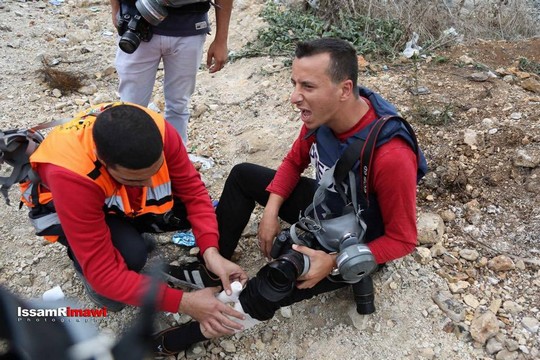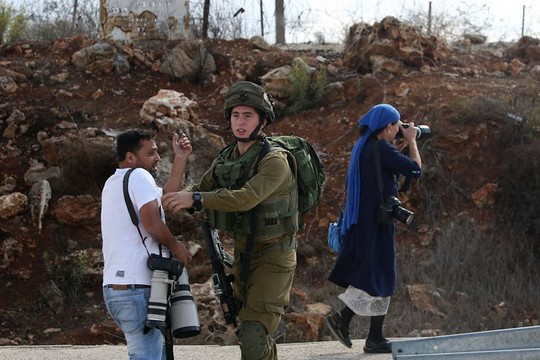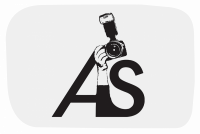Palestinian photojournalists, and some Israelis too, say they are being deliberately attacked by soldiers, police and even regular people on the street. The rubber-coated bullets, pepper spray and being denied access on grounds of ethnicity are nothing new, yet veteran Palestinian photographers say something is different this time.
By Oren Ziv / Activestills.org
Following the assault of two Israeli television journalists by civilians in a West Bank settlement last week, a member of Knesset announced that he will propose a law to increase the punishment for anybody who attacks a journalist. Nearly every Israeli media outlet covered the incident, and the national journalists’ association issued a harshly worded condemnation.
For Palestinian photojournalists working in the West Bank and East Jerusalem, however, being the on the receiving end of police and military violence is nothing new. It is commonplace, and it is most often completely ignored by Israeli journalists and politicians alike.
Conversations I’ve had with a large number of Palestinian journalists over the past few weeks, however, point to a new trend: Israeli authorities’ treatment of news photographers has taken a turn for the worse since the latest wave of violence began, and attacks against journalists and photojournalists have increased. Even more worrying, more than 10 Palestinian journalists and photographers told me they feel Israeli authorities are specifically targeting them.
As a photojournalist myself, I have rushed to the scenes of a decent number of violent incidents in Jerusalem over the past month and a half. In all of the cases when attempted attacks against Israelis led to the death of a young Palestinian, usually the attacker, I personally witnessed police officers preventing journalists from doing their jobs. Sometimes it was as simple as denying access to the scene; other times it resulted in physical violence against them.
Deliberate violence against Palestinian photographers was on full display last Friday when a Border Police officer was filmed shooting pepper spray directly at a group of photographers and paramedics — all of whom were wearing clearly marked vests identifying them as such. The incident (pictured below), which took place near the northern entrance of the West Bank city of Ramallah, happened after a Border Police jeep chased down and ran over a young Palestinian, whom the Border Police officers claimed threw a Molotov cocktail at them.
Trying to control the narrative?

I asked a group of Palestinian photographers who work for foreign media outlets to talk to me about the violence they have experienced recently. All three of them have been working non-stop over the past month and a half, without any days off, running from one stabbing attack to the next shooting – between checkpoints, demonstrations, and clashes. Because their employers have not authorized them to be interviewed and because they fear retribution by Israeli authorities, they asked to remain anonymous.
“It’s simply life-threatening,” R. tells me at a table of four photojournalists sitting at a restaurant in East Jerusalem. “You arrive at the scene of an attack, stay behind the police tape, and start photographing. All it takes is for one policeman to yell at you, and the rest of them jump on you.”
R., who has photographed for a European news agency in Jerusalem for upwards of 10 years, says he believes officers’ violent behavior toward journalists is the result of orders handed down from above. “In the past month I was beaten three times by police officers in different incidents. Sometimes they used their rifles to hit me. A lot of times I just put my hands in the air so they can’t say I attacked them.”
Attempts to keep journalists away from the scenes of the attacks in recent weeks are part of efforts to control the flow of information, R. estimates, and sometimes even preventing certain details from being reported at all. “As a journalist, when you arrive at the scene and things are still happening, you are able to see exactly what happened. You can say whether there was a knife there or not, how many wounded there are.”
In one case last week, R. recalls, he and his editor challenged a police report that only one person had been wounded in a stabbing attack near Ammunition Hill in Jerusalem. Only after insisting, based on R.’s eye witness account, did police eventually admit that a second person had been accidentally wounded by civilians and officers who shot over 20 bullets toward the Palestinian attacker.
‘And then they shot me’

Others like “F.”, a veteran news photographer who has worked in the West Bank and Jerusalem for years, believe that Israeli politicians incitement against the media is responsible for way police are treating journalists. “The astounding part is that attacking the press is justified both by society and by the establishment these days,” he adds. “The first step toward fascism is turning against the media. Israeli society is shifting to the right and it doesn’t want a mirror held up to itself — it doesn’t want to see what’s actually happening.”
Samer Nazal is a Palestinian photojournalist who works for the “Raya” news agency. A week and a half ago he says he was targeted by Israeli troops near the northern entrance to Ramallah, adjacent to the Israeli settlement of Beit El, where clashes between Palestinian youths and the army have been taking place on a near daily basis.
“We were standing in a group of journalists and everything was calm, the soldiers were far from us,” he recalls to me. “Suddenly three jeeps came speeding in and the protesters scattered. I felt unsafe so I decided to move locations. I was 15 meters from the soldiers, which means it would have been impossible for them to not see that I am a journalist — I was wearing a protective vest with ‘PRESS’ written on it. And then they shot me.”
Samer was struck in the leg by two rubber-coated steel bullets and taken to a hospital in Ramallah for treatment. “While my colleagues were carrying me to the ambulance, the soldiers who had shot me moments earlier looked on and laughed,” continues Samer, who hasn’t been able to walk since. “I’m certain that the soldiers intentionally targeted us, the journalists.
The hostility does not only manifest itself in direct physical violence, however. Troops often will simply block access to Palestinian journalists, Samer adds.
‘He’s Israeli, you’re Palestinian’

Last weekend a photo made the rounds on social media showing Palestinian photographer Alla Badarna being shoved by a soldier. Behind them, an Israeli photographer is taking pictures without any interference.
The incident started when Israeli Border Police officers shot and killed Palestinian man on a scooter and seriously wounded his passenger, claiming that the pair was trying to stab the officers, Alla says. “I was nearby and I got to the scene first.”
“I got out of the car and as soon as I started to photograph a settler shouted to the soldiers, ‘arrest him he’s a Palestinian.’ The soldiers started pushing and cursing me. I explained that I only need five minutes to photograph and then I would leave. They didn’t care. One of the soldiers got out his pepper spray, aimed it at my face and said, ‘If you don’t leave I will spray you.’ I told him that wouldn’t be necessary, and got into my car,” Alla recalls.
“As I was getting ready to leave I saw an Israeli photographer I know taking photographs,” Alla continues. “I walked over to say hi and we shook hands. Clearly annoyed, the same soldier who attacked me earlier came back and started pushing me again. I told them that [my colleague] is a photographer too, but one of them said, ‘He’s Israeli and you’re Palestinian. A Palestinian tried to stab us’.”
Alla says he was shocked by the blatant discrimination and that the soldier simply didn’t care when he tried to explain he is a professional journalist just doing his job. “While he was pushing me back toward my car another Israeli photographer passed by and said to the soldier: ‘It’s okay, I’m allowed to be here.’ He just let her pass without checking her [credentials] and continued pushing me away.”
Alla has been working for the foreign press in the West Bank for 17 years and is familiar with the ways soldiers treat him and other photographers. “During the Second Intifada it was hard for everybody to photograph because there were closures and gun battles, but in recent years it has always been clear who is a photographer and who isn’t — it has been clear that we are not part of the protests. So why are they distinguishing between Palestinian and Israeli photographers?” That’s the main question for Alla. “Why are they singling me out as a Palestinian?”
Not just Palestinians
Israeli authorities’ new policy toward journalists, even if it’s not official, is not only affecting Palestinian photographers. “It has become scarier to go out and work recently. Even the civilians don’t want you to be there,” an Israeli photographer who works for an American media outlet tells me. He also asks to remain anonymous because he is not authorized to be interviewed.
Israeli authorities stopped distinguishing between protesters and journalists a long time ago in the territories, he adds. “If you’re filming from the Palestinian side, as far as the police and army are concerned, you are part of the protest, and that means you can be shot.”
D., another Israeli photojournalist tells of being assaulted and falsely detained by soldiers who weren’t happy that he photographed them frisking a young Palestinian man in the occupied West Bank city of Hebron. “’You can’t photograph,’ the soldier told me. I explained that we were on a public street where I’m allowed to be, but they didn’t care.”
It got violent quickly. “’Take one more photo and I’ll arrest you,’ the soldier said. He and the other soldier threw me to the ground and tried to handcuff me. Twenty minutes later a police officer arrived and explained to the soldiers that I am allowed to photograph,” he says.
“I don’t care if that soldier gets punished, I only want them to pass along the message to every soldier in the field — that we’re allowed to work freely.” D. has since filed a complaint to the IDF Spokesperson.
Adapting for survival
But back to East Jerusalem. The television in the restaurant where we’re sitting in is broadcasting a live feed from outside the Israeli military prison, Ofer, where a few youngsters are throwing stones at a similarly small number of soldiers. “We try and find ways of protecting ourselves,” R. says of the ways photographers are coping with police and military violence. “We find a faraway point and photograph with zoom lenses, and the moment we have enough photos we don’t waste a single minute, we just get out of there.”
As if all that weren’t enough, things got even worse several weeks ago after a Palestinian man wearing “PRESS” insignia stabbed an Israeli soldier outside Hebron. The man, who was not a journalist, approached the soldier out of a group of legitimate news photographers.
That attack had an immediate negative impact on Palestinian photojournalists. A number of photographers with whom I spoke left protests they were covering across the West Bank as soon as they heard what happened out of fear that soldiers would retaliate. Ever since, at the scene of attacks across the West Bank and Jerusalem, access as been severely restricted to photographers, who have mostly been barred from approaching soldiers and police officers.
The Palestinian journalists’ association published a harshly worded condemnation the same day, as did the Foreign Press Association. Both groups warned that the suspicions created by such attacks pose a danger to the lives of professional journalists. “Everybody is worried that it will be open season on reporters,” FPA director Glenys Sugarman told the Associated Press at the time.
‘They called me a leftist, and attacked’
It is not only law enforcement and soldiers whom journalists have reason to fear, however. Everyone is afraid of everyone these days and even photographers are scared, of police, of stone-throwing Palestinian youths, and of right-wing Israelis on the streets, explains “A.”, a veteran Palestinian photographer from Jerusalem. A. says he sometimes prefers to let Jewish colleagues photograph stabbings or incidents in the western, largely Jewish part of the city. “But the Jewish photographers are also scared because people on the street think they are leftists and attack them.”
And not only Jewish photographers are attacked for being “leftists.” A. says that he was actually misidentified as a Jew by a crowd forming at the scene of a stabbing in Jerusalem last month, but that didn’t offer him any safety either: “they called me a leftist and attacked me.”
Sometimes, however, authorities are actually eager for journalists to do their jobs — as long as it advances the narrative they want to promote. At the scene of one attack that got international coverage last month, R. says, Israeli police wanted journalists to photograph. “Why did they let us photograph? Because it was straightforward. A kid was running with a knife and was shot. In that case they wanted to show the world what happened.”
“If somebody is afraid of photographers it means that they are doing something illegal, or something wrong,” R. concludes.
Requests for comment were sent to spokespeople for the IDF, the Border Police and the Israel National Police about the specific incidents described in this article as well as the general treatment of press photographers. None of them had responded at the time of publication. If and when we receive a response it will be added here.
A version of this article also appeared in Hebrew on Local Call. Read it here.


